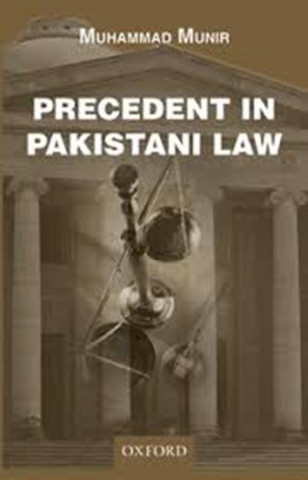Legal technicalities: Prioritising precedent - filling the gap in domestic discourse
Book tackles “most oppressed of topics” in a bi-jurial legal system.

Book tackles “most oppressed of topics” in a bi-jurial legal system. PHOTO: PUBLICITY
In a way, Dr Muhammad Munir has written an unprecedented book.
Munir, who is an associate professor at the International Islamic University Islamabad’s law department, was disturbed by the fact that no Pakistani jurist has “reliably” written about the doctrine of “precedent.”
The country’s legal fraternity would testify to the fact that precedent is extremely important in Pakistan’s legal system. Article 189 of the Constitution of Pakistan uses this doctrine to make the Supreme Court’s judgments “binding” on lower courts, with some qualifications.

Taking this into account, Munir went ahead and wrote about this “most oppressed of topics” himself. The Oxford University Press has published his book recently with the title “Precedent in Pakistani Law.”
Munir and his teacher Justice (Retd) Ali Nawaz Chohan spoke at a talk and discussion on the book and the issue addressed in it at the OUP bookstore in Blue Area on Friday.
Chohan explained to the audience that precedent basically serves the purpose of “applying lessons from the past for solving problems of the present and the future.”
The retired judge of the Lahore High Court said precedent, or “stare decisis” as it is called in Latin, is strictly used in Pakistan and is a source of law. He outlines two main advantages of precedent: it provides certainty and consistent decisions.
But there is a problem, Chohan said.
“This might shock you, but we do not have a Supreme Court,” he said. What Chohan meant was that the Pakistani Supreme Court’s judges never sit together (perhaps like the judges of the US Supreme Court do), rather they hear cases as benches.
“In this scenario, the stare decisis gets divided,” he said. “It is an assortment of sorts, like Cadbury’s chocolates.”
This is harmful because it means that if one party finds a precedent for its case, it is equally likely that another party on the same case would find an opposing precedent, he said Chohan.
Munir went ahead and said that even the language of Article 189 is not fully understood by the country’s judges. He said there is no legal consensus on what “binding” means and what is the “ratio” — Latin for rule — which would be binding on lower courts.
So, Pakistani jurists rely on “textbooks” by foreign jurists, he said. The book was born out of the idea to fill this gap in domestic discourse on precedent law, Munir said.
“The book was written to provide some good to the legal fraternity and the serious readers, both lawyers and judges,” he said.
Munir spoke of the huge structural change wrought in the legal system when the British introduced the precedent law in pre-partition India. Since then, the postcolonial governments of Pakistan, India and Bangladesh have given constitutional status to precedent, he said.
In a chapter of the book, Munir discusses the hierarchy of the Pakistani judicial system while in another chapter, he discusses precedent with respect to Shariah law to cover the bi-jurial nature of the Pakistani legal system.
Chohan said that the book is well-written and that he “enjoyed reading it.”
Published in The Express Tribune, January 19th, 2014.



















COMMENTS
Comments are moderated and generally will be posted if they are on-topic and not abusive.
For more information, please see our Comments FAQ